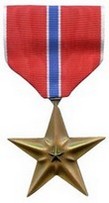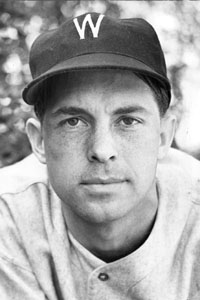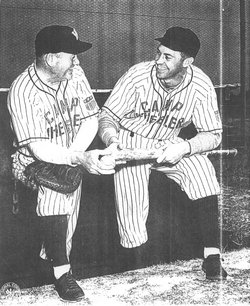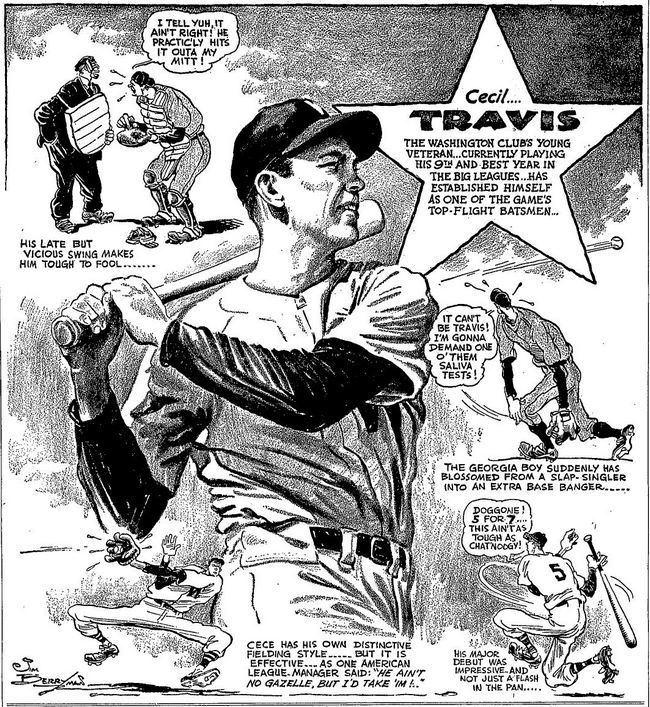

|
|
 Cecil Travis
Cecil Travis
Date and Place of Birth: August 8, 1913 Riverdale, Georgia
Date of Death: December 16, 2006 Riverdale, Georgia
Baseball Experience:
Major League
Position: Shortstop
Rank: Sergeant
Military Unit: 76th Infantry Division, US Army
Area Served: European Theater of Operations
The Camp Wheeler Spokes, led by the hitting of Cecil Travis, defeated the Enidairs from Enid, Oklahoma, 8-3, last night in the national semi-pro baseball tournament. Travis hit a home run in the seventh with two men on.
Brainerd Daily Dispatch August 23, 1943
 Cecil H Travis
was born on a farm in
Cecil H Travis
was born on a farm in
 Despite his age Travis quickly established himself as one
of the outstanding players of the American League. Had he not been
playing for the perennial second-division Senators he would have
been hailed a superstar. Playing shortstop and third base Travis had
compiled a lifetime batting average of .322 by 1940, and his 1941
season – his ninth in the major leagues – was by far his best.
Playing in all 152 games for the Senators, Travis batted an
outstanding .359 (second only to Ted Williams’ incredible .406). He
led the league with 218 hits and finished second with 19 triples. He
also had a career-high 101 RBIs.
Despite his age Travis quickly established himself as one
of the outstanding players of the American League. Had he not been
playing for the perennial second-division Senators he would have
been hailed a superstar. Playing shortstop and third base Travis had
compiled a lifetime batting average of .322 by 1940, and his 1941
season – his ninth in the major leagues – was by far his best.
Playing in all 152 games for the Senators, Travis batted an
outstanding .359 (second only to Ted Williams’ incredible .406). He
led the league with 218 hits and finished second with 19 triples. He
also had a career-high 101 RBIs.
But as quickly as Travis reached the top of his game his
career was put on hold. He entered military service on January 9,
1942 and would be away from the game for four seasons. He thought he
might be in for a year or so, “but you didn’t think you were going
to be there so long,” he later said.
Travis was assigned to
Travis played and managed the Camp Wheeler Spokes
baseball team and led the team in hitting with a .472 average after
ten games in 1942. The Spokes went on to win the
In May 1944, Sergeant Travis was assigned to the 76th
Infantry Division’s combat training facility at
 The
76th Infantry Division was sent to Europe in late 1944
and entered combat on January 19, 1945, during the final stage of
the
The
76th Infantry Division was sent to Europe in late 1944
and entered combat on January 19, 1945, during the final stage of
the
The 76th Infantry
Division advanced more than 400 miles against hostile resistance in
110 days of combat. It captured more than 33,000 prisoners and
teamed up with the 6th Armored Division to form the spearhead of the
Third Army’s plunge across
Travis received a Bronze Star and four battle stars during
his time in
He immediately returned to the Senators. "It was
amazing the way Cece swung in his drill at Griffith Stadium
yesterday,” reported John B Keller in the Washington Evening Star
on September 8, 1945. “His easy left-hand stance at the plate was no
different from that he assumed when he was one of the sensations of
the American League in offense."

But the truth was the 31-year-old was seriously out of
condition. He was slow afoot, his bat speed was sluggish and his
feet still hurt. Travis played his first major league game in four years on September 8, 1945
against the Browns. He played 15 games before the season ended
and batted just .241.
Everyone, including Travis himself, hoped the
off-season rest and spring training would bring back the magic. In
1946, Manager Ossie Bluege played him a lot of the time at third
base where less range was required, and there were days when he
looked like the pre-war all-star he had been. But they were few and
far between. Travis batted just
.252 in 1946 and struggled to keep his average above .200 in 1947.
For the first time in his career, he found himself sitting on the
bench.
One month before the end of the season he was honored with
"Cecil Travis Night" at Griffith Stadium, with General Dwight D.
Eisenhower in attendance. Why honor a player who was little more
than a bench warmer at that stage? Because Cecil Travis was one of
the nicest, most honorable gentlemen to ever play the game of
baseball. When major league umpire Bill McGowan was chatting with a
group of soldiers after a USO show during the war, somebody asked,
“Who would you say was the player who had given you the least
trouble in a major league game, the one you think most admirable in
his conduct on the field and at bat?”
“Cecil Travis,” McGowan replied without hesitation.
Travis left the game
as graciously as he had come into it. "My problem was my timing. I
could never seem to get it back the way it was after laying out so
long. I saw I wasn't helping the ball club, so I just gave it up."
Travis declined an
offer to manage in the minors and returned instead to his family
cattle farm in
Travis did remain
involved in baseball as a part-time scout for the Senators' until
1956. He then turned his full attention to cattle farming for the
next 50 years
Cecil Travis, of whom Ted Williams once said “is one of
the five best left-handed hitters I ever saw,” passed away at his
home in
He had been inducted
into the Georgia Sports Hall of Fame in 1975 and added to the Hall
of Stars at
Thanks to the late Cecil Travis for help with his biography.
Created January 14, 2007. Updated April 29, 2008.
Copyright © 2008 Gary Bedingfield (Baseball in Wartime). All Rights Reserved.